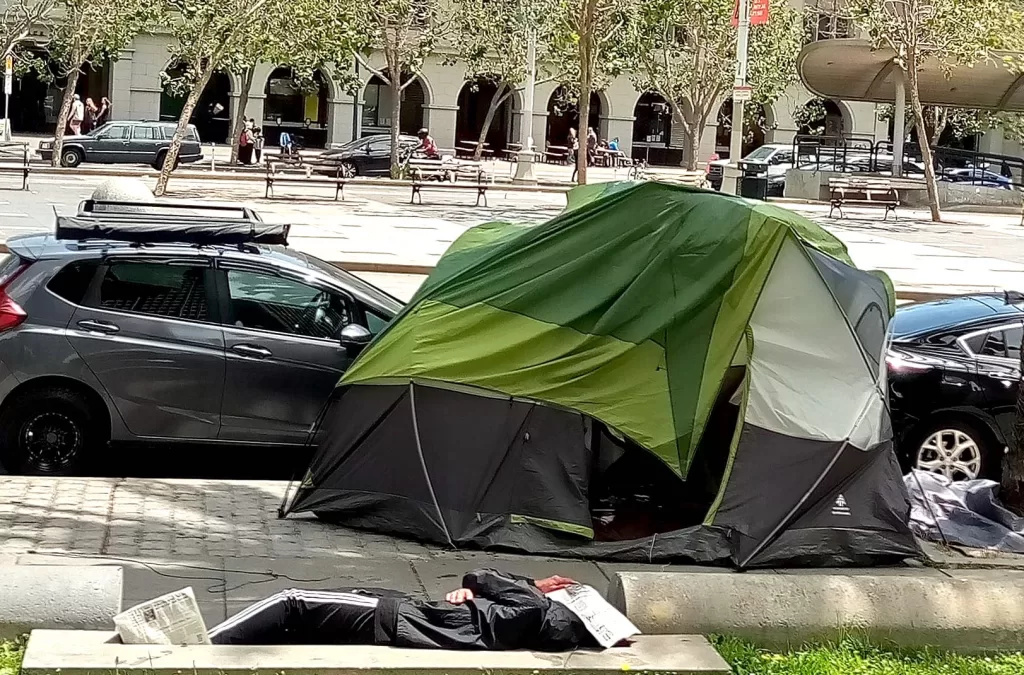
“ The City’s waitlist for the shelter system has more than 400 people on it, while the Department of Homelessness and Supportive Housing reports that there are just about 3,000 beds for 7,000 unhoused City residents. According to the Coalition on Homelessness, this gap reflects a human rights crisis. . .”
Editor’s Note: Update on the lawsuit on the City of San Francisco’s sweep of homeless encampments: On September 5, the 9th Circuit denied without prejudice the City’s motion to modify the Judge Ryu’s preliminary injunction. Here is the ruling in full: “The City’s motion to modify the preliminary injunction raises the sole issue of the definition of ‘involuntarily homeless.’ Because the parties agree that a person is not involuntarily homeless if they have declined a specific offer of available shelter or otherwise have access to such shelter or the means to obtain it, and because the district court has denied the plaintiffs’ motion to enforce the injunction, the City’s motion to modify the preliminary injunction is DENIED WITHOUT PREJUDICE. The court will address all the other issues raised by the appeal in due course.”
A lawsuit over San Francisco’s sweeps of homeless encampments continued as two separate hearings were held last week.
Those hearings may end up being a prelude to more action in court if the lawsuit comes to trial. Along with seven unhoused plaintiffs, the homeless advocacy organization Coalition on Homelessness—which also publishes Street Sheet—accused City workers of violating unhoused residents’ rights and destroying their property while clearing camps off the streets.
On August 23, both sides argued before the 9th U.S. Circuit Court of Appeals, as the City appealed a preliminary injunction barring the City from sweeps while the lawsuit is in progress. At issue was how the injunction defined “involuntary homelessness”—specifically, whether it applies to someone who refuses shelter for any reason when the City sweeps an encampment. The injunction prohibited the City from enforcing certain penal codes—particularly state and municipal bans on sleeping on the streets—in cases when it had no shelter available. As of press time, the three-member panel of judges hasn’t issued a ruling.
On the following day, August 24, in the U.S. District Court of Northern California, U.S. Magistrate Judge Donna Ryu denied the plaintiffs’ motion to appoint a “special master” to monitor homeless operations and ensure that the City complies with the injunction.
Ryu said the plaintiffs didn’t provide enough clear evidence showing that the City violated the previous order by threatening to arrest unsheltered people if they didn’t move along.
“There’s a pretty significant gap of information concerning violations of the injunction that continue to persist,” she said.
However, Ryu gave both sides until September 22 to file new declarations with additional information. She ordered the plaintiffs to show more details about their assertions of City workers threatening to arrest street dwellers. At the same time, she called for the City to provide information on how San Francisco Public Works trains staff on the department’s “bag and tag” policy and how police inform homeless people of their rights during these operations. She also asked for police data on homelessness-related calls.
Two weeks earlier, the City rejected the plaintiffs’ offer to settle out of court. Zal Shroff, an attorney representing the plaintiffs, pointed out the lack of available shelter and housing for unhoused San Franciscans at an August 10 press conference. As of publication time, the City’s waitlist for the shelter system has more than 400 people on it, while the Department of Homelessness and Supportive Housing reports that there are just about 3,000 beds for 7,000 unhoused City residents.
According to the Coalition on Homelessness, this gap reflects a human rights crisis. In a thread on X, formerly Twitter, the Coalition wrote, “We offered a hand in collaboration, but the City’s reluctance to work together is troubling. We believe in a solution where compassion and human rights lead the way.”
The Coalition commented in the same thread on the City’s rejection of the settlement offer, and criticized the City’s support for protesters who rallied outside the 9th Circuit’s courthouse urging the injunction to be lifted. Mayor London Breed appeared at the rally and slammed the Coalition.
“It became more clear how false the City’s claims are that the lawsuit is ‘holding them hostage,’” the Coalition posted, referring to the mayor’s comments. “One judge noted that the City’s arguments appeared to be ‘manufactured’—in other words, not real and just mere political theater.”
The Coalition added that the panel rejected the City’s arguments of its inability to enforce any homelessness ordinances.
A trial date has been set for April 15, 2024.
This article is reprinted here by permission of the Street Sheet, where it first appeared.
